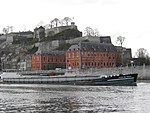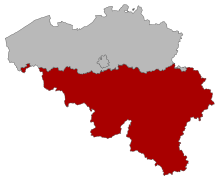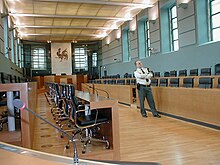Walloon Parliament
| logo | Parliament building |
|---|---|
|
|

|
| Basic data | |
| Seat: | Rue Notre-Dame 1 5000 Namur |
| Legislative period : | 5 years |
| First session: | October 15, 1980 |
| MPs: | 75 |
| Current legislative period | |
| Last choice: | May 26, 2019 |
| Chair: | Jean-Claude Marcourt (PS) |
| Distribution of seats: |
Government (55)
|
| Website | |
| parlement-wallon.be | |
The Walloon Parliament or Parliament of the Walloon Region ( French Parlement wallon or Parlement de la Région wallonne ) is the legislative body of the Walloon Region (Wallonia) of Belgium with its seat in the Hospice Saint-Gilles in Namur . MEPs have been directly elected every five years since May 21, 1995; before that, the Council was indirectly elected.
The Parliament is responsible for the legislation of the Walloon Region (the so-called "decrees"), parliamentary control of the government and administration and setting the budget. It is made up of 75 members who are divided into five parliamentary groups in the current legislative period: Parti Socialiste (PS, Social Democrats), Mouvement Réformateur (MR, Liberale), Ecolo (Greens), Center Démocrate Humaniste (cdH, Christian Democrats) and Parti du Travail de Belgique (PTB, communists).
The last regional election took place on May 25, 2014 at the same time as the European elections and the election of the Chamber of Deputies .
history
The three regions of Belgium were constitutionally created during the first state reform in 1970, but this was only a provisional regionalization through the so-called " Perin - Vandekerckhove Law ". At this point in time, the first regional councils were also set up, which were composed of the senators of the respective language groups in parliament and had an exclusively advisory function. The first Walloon Regional Council, the predecessor of the Walloon Parliament, held its first meeting on November 26, 1974, chaired by Franz Janssens ( PLP ). However, the opposition Socialists refused to recognize this assembly and boycotted it. In 1977, when the PS under Léon Hurez regained the majority of the national government under Prime Minister Leo Tindemans ( CVP ), the regional councils were dissolved and abolished for the time being.
In the absence of an official institution, the Walloon parliamentarians held an informal meeting on May 14, 1979, at which the ministers and state secretaries responsible for Walloon affairs read out their own government statement. The same assembly, on December 10th of the same year, called for the immediate creation of a regional legislative body before which the Walloon ministers would be constitutionally responsible.
It was not until the second Belgian state reform in 1980 that the regions were actually used. The constitution was amended and the regional councils were given their own legislative competence. However, they were still indirectly composed: the members of the Chamber of Deputies and the Senate elected in the Walloon Region were by right members of the Walloon Regional Council. The first session as an independent parliamentary assembly took place on October 15, 1980 under the chairmanship of the senior president Georges Glineur ( PCB ) in the Sofitel hotel in Namur. The first Walloon regional executive under Prime Minister André Damseaux ( PRL ) received the Council's confidence on 23 December 1981.
The responsibilities of the regional councils were expanded considerably in 1989 and 1993. With the fourth state reform, they were also converted into directly elected parliamentary assemblies. The first regional election took place on May 21, 1995. In the same year, the Walloon Regional Council also decided that from now on it would be called the "Walloon Parliament". However, the constitution was not officially amended until 10 years later.
composition
General
The Walloon Parliament shall be composed of 75 deputies, who every five years - the same time as the European elections - directly elected are.
The members of the Walloon Parliament are also members of the Parliament of the French Community (also known as the "Parliament of the Wallonia-Brussels Federation"). The Walloon MPs, who are also members of the Parliament of the German-speaking Community (DG Parliament), are an exception : they are incompatible and they will be replaced by a successor in the Parliament of the French Community. The Walloon MPs who take their constitutional oath first or only in German (“I swear to obey the constitution”) are subject to the same incompatibility.
Electoral system
The 75 members of the Walloon Parliament are elected by the voters of the Walloon Region (French and German-speaking areas), which is divided into 13 constituencies. Within these constituencies, the various seats are allocated in relation to the population of the respective constituency.
There are two columns on the electoral lists: on the one hand the effective candidates and on the other hand the substitute candidates. These substitute candidates can accept a mandate in parliament if an effectively elected candidate has to resign (for example because he is moving to government or due to some other incompatibility).
The following conditions must be met in order to be able to participate in the election ( active voting rights ):
- have Belgian citizenship,
- be at least 18 years old,
- be registered in the population register of a municipality in the Walloon Region,
- are not in one of the legal grounds for exclusion (such as a sentence of more than four months in prison).
As in all elections in Belgium, voting is compulsory. Each voter has one vote, which he can either give to the entire list ("head vote"), or which he can distribute to the candidates on a list in order to influence the internal order of the candidates on a list ("preferred vote").
The seats are distributed proportionally according to the so-called D'Hondt procedure, separated by provinces, named after the Belgian legal scholar Victor D'Hondt (1841-1901).
MPs
To become a member of the Walloon Parliament ( right to stand for election ) four conditions must be met:
- have Belgian citizenship,
- be at least 18 years old,
- be registered in the population register of a municipality in the Walloon Region,
- are not in one of the legal grounds for exclusion.
The office of MP is incompatible with certain other functions. So it is not possible to be a member of parliament and hold a ministerial office at the same time.
MEPs also enjoy a certain parliamentary immunity . The right to freedom of expression, which is already anchored in the constitution as a fundamental right, is strengthened for parliamentarians. The criminal liability of parliamentarians is also subject to special provisions. Unless discovered in the act, an MP can only be arrested with the permission of Parliament. An MP who is being prosecuted can at any time ask Parliament to suspend the prosecution. These guarantees are only valid during the session periods.
Current parties in parliament
There are five parties in the parliament elected in 2019 and working until 2024:
| logo | Political party | Alignment | Party chairman / party leader |
Seats | |||
|---|---|---|---|---|---|---|---|
| after the election |
current | +/- | |||||
|
|
Parti Socialiste (PS) Socialist Party |
social democratic | Elio Di Rupo | 23 | 23 | ||
|
|
Mouvement Réformateur (MR) Reform movement |
liberal | Georges-Louis Bouchez | 20th | 20th | ||
|
|
Ecolo | green alternative |
Zakia Khattabi , Jean-Marc Nollet |
12 | 12 | ||
|
|
Parti du Travail de Belgique (PTB) | socialist | Peter Mertens | 10 | 10 | ||

|
Center Démocrate Humaniste (cdH) | Christian Democratic | Maxime Prévot | 10 | 10 | ||
| total | 75 | 75 | |||||
president
The Walloon Parliament is chaired by the President, who is re-elected every five years at the beginning of the legislative period. It traditionally comes from the government majority, but usually acts in a non-partisan way. The President chairs the plenary session, ensures order in the assembly and compliance with the rules of procedure. He also chairs the Presidium.
Jean-Claude Marcourt (PS) has been President of the Walloon Parliament since 13 September 2019 .
The former chairmen are:
- 1980–1981: Léon Hurez (PS)
- 1981–1985: André Cools (PS)
- 1985–1988: Charles Poswick (PRL)
- 1988: Valmy Féaux (PS)
- 1988–1995: Willy Burgeon (PS)
- 1995–1997: Guy Spitaels (PS)
- 1997: Jean-Marie Severin (PRL) (acting)
- 1997–1999: Yvon Biefnot (PS)
- 1999–2000: Richard Miller (PRL)
- 2000–2004: Robert Collignon (PS)
- 2004–2009: José Happart (PS)
- 2009–2012: Emily Hoyos (Ecolo)
- 2012–2014: Patrick Dupriez (Ecolo)
- 2014–2019: André Antoine (cdH)
Election results
Current parliament
The current Walloon Parliament was composed on June 11, 2019, following the regional elections on May 26, 2019.
The Social Democrats (PS) continued to emerge as the strongest group in the polls, but lost a few percentage points. The liberals (MR) and center humanists (cdH) also had to complain about loss of votes and seats. Ecolo and PTB, however, were able to increase their results.
As the strongest party, the Parti Socialiste took the initiative to form a government. After initiatives for a three-party alliance between the PS and Ecolo and cdH as well as with Ecolo and PTB failed and a tolerance of a minority government of PS and Ecolo was rejected by all other parties, the PS finally invited the Liberals (MR) to coalition talks. This eventually led to a coalition of PS, Ecolo and MR under the leadership of Elio Di Rupo .
| Election to the Walloon Parliament 2019 | |||||||
|---|---|---|---|---|---|---|---|
| Political party | be right | Seats | |||||
| number | % | +/- | number | +/- | % | ||
| Parti Socialiste (PS) | 532,422 | 26.17 | 4.73 | 23 | 7 | 30.67 | |
| Mouvement Réformateur (MR) | 435,878 | 21.42 | 5.26 | 20th | 5 | 26.67 | |
| Ecolo | 294,631 | 14.48 | 5.86 | 12 | 8 | 16.00 | |
| Parti du Travail de Belgique (PTB) | 278,343 | 13.68 | 7.92 | 10 | 8 | 13.33 | |
| Center Démocrate Humaniste (cdH) | 223,775 | 11.00 | 4.17 | 10 | 3 | 13.33 | |
| DéFI | 84.219 | 4.14 | 1.61 | 0 | 0.00 | ||
| Parti Populaire (PP) | 74,622 | 3.67 | 1.20 | 0 | 1 | 0.00 | |
| Destexhe | 30,878 | 1.52 | New | 0 | New | 0.00 | |
| Collectif Citoyen | 26,673 | 1.31 | New | 0 | New | 0.00 | |
| DierAnimal | 18,417 | 0.91 | New | 0 | New | 0.00 | |
| nation | 9,649 | 0.47 | 0.06 | 0 | 0.00 | ||
| Wallonia Insoumise | 8,155 | 0.40 | New | 0 | New | 0.00 | |
| AGIR | 7.146 | 0.35 | New | 0 | New | 0.00 | |
| Demain | 4,443 | 0.22 | New | 0 | New | 0.00 | |
| La Droite | 3,407 | 0.17 | 1.22 | 0 | 0.00 | ||
| Otherwise. (less than 0.1%) | 2,155 | 0.10 | - | 0 | 0.00 | ||
| Valid votes | 2,034,813 | 91.64 | |||||
| Invalid votes | 185.630 | 8.36 | |||||
| Votes cast | 2,220,443 | 100.00 | - | 75 | 100.00 | ||
| Number of eligible voters and turnout | 2,563,033 | 86.63 | 1.15 | ||||
Allocation of seats since 1995
| Legislative period | PS | MR * | cdH * | Ecolo | FN | PTB | PP | independent | coalition |
|---|---|---|---|---|---|---|---|---|---|
| 1995-1999 | 30th | 19th | 16 | 8th | 2 | - | - | - | PS + PSC |
| 1999-2004 | 25th | 21st | 14th | 14th | 1 | - | - | - | PS + PRL-FDF-MCC + Ecolo |
| 2004-2009 | 34 | 20th | 14th | 3 | 4th | - | - | - | PS + cdH |
| 2009-2014 | 29 | 19th | 13 | 13 | - | - | - | 1 | PS + cdH + Ecolo |
| 2014-2019 | 30th | 25th | 13 | 4th | - | 2 | 1 | - | PS + cdh, from 2017 MR + cdH |
| since 2019 | 23 | 20th | 10 | 12 | - | 10 | - | - | PS + MR + Ecolo |
* MR initially ran under the name “PRL-FDF” (1995) and then under the name “PRL-FDF-MCC” (1999). The cdH ran in 1995 and 1999 under the name "PSC".
See also
literature
- Michel Collinge: Le Parlement wallon . In: Courrier hebdomadaire du CRISP . No. 1520 , 1996, ISSN 0008-9664 .
- Jacques Brassine: Le Conseil régional wallon, 1974-1979, Histoire d'une institution oubliée . Institut Jules Destrée, Namur 2007, ISBN 978-2-87035-042-3 .
- Philippe Destatte: Histoire succincte de la Wallonie . Institut Jules Destrée, Namur 2013 ( Online [PDF; 616 kB ; accessed on June 1, 2015]).
Web links
- Official website of the Walloon Parliament (French)
- The Walloon Parliament in "Connaître la Wallonie" (French)
Individual evidence
- ↑ http://www.parlement-wallon.be/groupes
- ↑ FPS Home Affairs: Election 2014. Accessed June 1, 2014 .
- ↑ Law of August 1, 1974 creating regional institutions to prepare the application of Article 107quater of the Constitution ( BS August 22, 1974; Erratum August 29, 1974). See also: parlement-wallon.be: Le Parlement wallon - L'historique. Retrieved June 1, 2015 (French).
- ↑ Law of July 19, 1977 amending the law of August 1, 1974 creating regional bodies to prepare the application of Article 107quater of the Constitution ( BS July 27, 1977).
- ^ Resolution of the Walloon Parliament of April 5, 1995.
- ↑ Article 24, § 2 of the special law of August 8, 1980 on institutional reform ( BS August 15, 1980). See also: parlement-wallon.be: Le Parlement wallon - Les députés wallons. Retrieved June 1, 2015 (French).
- ↑ Articles 116–117 of the (coordinated) constitution .
- ↑ Article 24, § 3, No. 1 of the Special Act of August 8, 1980.
- ↑ Article 24bis, § 4, paragraph 1 and Section 5, Paragraph 2 of the Special Act of August 8, 1980.
- ↑ Article 31bis of the Special Act of August 8, 1980.
- ↑ Article 24bis, § 4, paragraph 2 and Section 5, Paragraph 3 and Article 50, Paragraph 2 of the Special Act of August 8, 1980.
- ↑ Article 26 of the special law of August 8, 1980 u. Article 5 and Annex I of the Ordinary Law of July 16, 1993 completing the federal state structure ( BS July 16, 1993). See also: Connaître la Wallonie: Connaître la Wallonie - Le Parlement wallon. Retrieved June 1, 2015 (French).
- ↑ Article 28 of the Special Act of August 8, 1980.
- ↑ Article 25, Section 1, Paragraph 2 of the Special Act of August 8, 1980.
- ↑ Article 26bis of the Special Act of August 8, 1980.
- ↑ Article 29 ff. Of the Special Act of August 8, 1980.
- ↑ Article 24bis, Section 1 of the Special Act of August 8, 1980.
- ↑ Article 119 of the Constitution and Article 24bis, § 2, 2bis and 2nd of the special law of August 8, 1980.
- ↑ Article 49 of the special law of August 8, 1980 u. Decree of the Walloon Region of July 13, 1995 organizing the replacement of ministers by their parliamentary deputy ( BS July 21, 1995).
- ↑ Article 58 u. 120 of the Constitution.
- ↑ Article 59 and 120 of the Constitution.
- ↑ parlement-wallon.be: Le Parlement wallon - Les organes du Parlement wallon. Retrieved June 1, 2015 (French).
- ↑ Results in numbers. In: elections2019.belgium.be. May 27, 2019, accessed May 27, 2019 .


